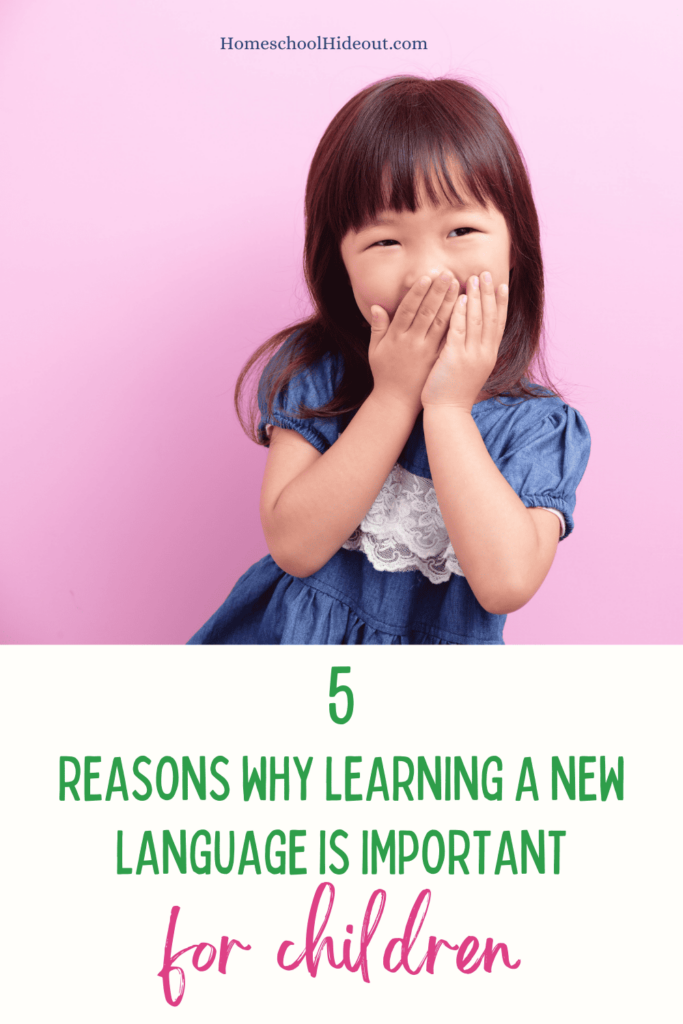Recent statistics suggest that approximately 7,000 languages are currently spoken worldwide.
Knowing more than one language helps children develop their cognitive, social, and emotional skills. It also gives them the ability to communicate more effectively with others and better understand and embrace different customs and cultural nuances, which can help them become more open-minded individuals.
There’s also another benefit: learning a language can open up many opportunities in the future for children as they become adults. It can give them access to jobs that require bilingualism or even allow them to travel abroad with ease since they’ll be able to communicate with people from other countries without any difficulty.
In this article, we’re going to take a closer look at the reasons why language learning is important for kids and how it can set them up for success in life.

Develop Broad Cultural Knowledge
Understanding a new language allows children to gain a deeper understanding of the culture associated with it. It opens up their minds to different perspectives and helps them appreciate the nuances of different cultures. By learning a new language, kids can explore different ways of thinking and living, as well as develop an appreciation for diverse cultures and traditions.
Many countries around the world have rich histories, traditions, customs, and values. For instance, the Philippines is home to a culturally rich society, and at the heart of this lively tapestry lies Tagalog, the national language of the Philippines. So if you want your children to learn
Tagalog quickly and appreciate Filipino culture, all you have to do is conduct research and find the best language app that offers interactive exercises and engaging activities that will make learning Tagalog fun.
Improves the Level of Empathy
Learning a new language is an important tool for developing empathy in children. Exposure to a new language, especially at an early age, can help kids develop a better understanding of the world around them and be more compassionate toward others. It also encourages them to explore different cultures and become more open-minded.
Empathy helps children understand the social norms of different cultures, leading to greater empathy and respect for other people’s beliefs and values. It also provides them with the opportunity to learn about different customs and traditions, which can help them form stronger bonds with people from diverse backgrounds.
Cognitive Benefits
According to research, learning and speaking a second language can do wonders for your children’s brains. The brains of kids who speak more than one language even work differently from those of single-language speakers. The brain’s functionality boosts as it has to communicate, recognize, and negotiate meaning within different language systems. Bilingual kids also score higher in math, vocabulary, and reading tests.
As multilingual children become better at switching languages, their problem-solving skills and ability to multitask improve. It has been proven that multilingual children are better at filtering out unnecessary information and focusing only on relevant information. Learning a new language can also help kids become more aware of their mother tongue and how to apply grammatical and stylistic rules.
Multilingual Kids Are More Creative
As we have said, learning another language allows children to see the world from a new perspective. It means that they will be more tolerant of other cultures. But did you know that children who know more than one language are more creative? This might surprise you, but it’s true. Children who speak more than one language can solve problems better and with greater creativity.
Better Job Opportunities
In an age of globalization, an increasing number of companies seek employees who speak more than one foreign language. Employees who speak more than one language often earn significantly more money than monolingual employees. Employers want employees who can communicate across borders and internationalize specific products and services. Individuals who are bilingual and have experience in the legal, medical, scientific, or technical fields may find lucrative jobs as translators or interpreters.
This is fantastic news for kids who are bilingual and have been exposed to more than one language at an early age. Children learn languages faster than adults, Therefore they learn a second one while still young and spend the rest of their university years specializing in an area that interests them. These bilingual speakers will then be able to charge a high price to translate texts that are related to their area of expertise.
Final Words
Although this isn’t a conclusive list, these are some of the reasons why it’s a smart idea to get your children to learn new languages. Multilingual children have better problem-solving skills, creativity, and job opportunities as adults. They will also learn to be more open to other cultures and become more tolerant of diversity.






